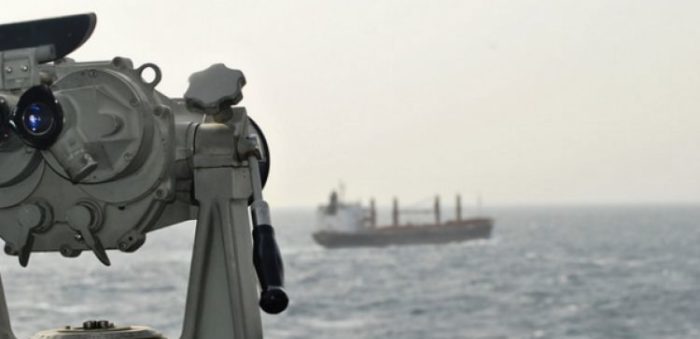The Nigerian Maritime Administration and Safety Agency (NIMASA), and the Nigerian Institute of Advanced Legal Studies (NIALS), stand against the high rate of piracy, armed robbery, and other maritime crimes on the Nigeria’s waterways.
According to NIMASA’s Director-General, Dr. Dakuku Peterside, said with the world’s waters account for more than 80% of transportation requirements in the global trading supply chain network, the risk of piracy, armed robbery and other maritime crimes remain a significant concern.
Mr. Peterside added that the Gulf of Guinea has been at the centre of maritime security discussions, due to piracy incidents in the area. As he explained, maritime security has been further compromised by lack of legislation.
Specifically, he said that the Suppression of Piracy and Other Maritime Offences Act, provides a a robust and detailed framework for the criminalisation and punishment of piracy and other maritime crimes in Nigeria and the Gulf of Guinea in general. He noted however that further discussion for judges will facilitate an understanding of the Suppression of Piracy and Other Maritime Offences Act.
In addition, participants must be equipped with the essential knowledge regarding the requirement of Nigeria’s obligations under the Act. Such discussion will also adopt interaction between the judiciary and enforcement officers to share ideas on potential challenges.
For his part, Director-General of NIALS, Prof. Mohammed Ladan, said the seminar theme is crucial because of the proposed, first stand-alone Anti-sea Piracy and maritime crimes law in the Gulf of Guinea. This aims to tackle sea piracy and armed robbery; activities that damage sustainable economic growth.
As he explained, West Africa and its trading partners lost around $2.3 billion to maritime crimes between 2016 and 2018, or about $777 million between 2015 and 2018, without considering the most important factor: human cost.
In its most recent piracy report, the International Maritime Bureau (IMB) highlighted that West Africa and particularly Gulf of Guinea have experienced a record high in piracy incidents, as the number of crew kidnapped in the Gulf of Guinea increased more than 50% from 78 in 2018 to 121 in 2019.
Cameroon
The territorial waters and ports of Cameroon were considered comparatively safe compared to other parts of the GoG until recently. However, since March 2019, at least two cases of piracy, involving three ships, have been recorded at Douala anchorage with several crew abducted.
For instance, in late December 2019, pirates attacked the Greek-flagged “Happy Lady” tanker from Limboh port in Cameroon and managed to kidnap 8 crewmembers out of which 5 of Greek nationality, two Filipinos and one Ukrainian.
Now, authorities are taking more steps to enhance the security onboard ships at Douala anchorage, including local armed guards on board each ship.
Benin
Since late January 2020, new steps have been taken by the Port of Contonou to protect ships whilst at port and at the anchorage.
Local authorities have advised that if a berth is unavailable for a ship, then local naval forces will assign an anchorage position to the ship and an armed guard will board the ship. This is a compulsory service however is provided free of charge.
Ghana
Piracy is reported as a serious threat in the territorial waters of Ghana. Pirates are attacking ships to steal both personal belongings as well as cargo, and in some cases, crew are being taken by pirates for ransom.
Local authorities have put in place several measures including that the anchorage areas for the two major ports (Tema and Takoradi) are regularly patrolled by the security officers of Ghana Ports and Harbours Authority (GPHA) and the territorial waters are patrolled by the Ghanaian Navy. The regular patrols by both GPHA and the navy are said to be deterring piracy activities.
In January 2020, Ghana’s Maritime Security sector urged for more investment towards enhancing maritime security, in order to protect Ghana’s territorial waters, after the rise in maritime security threats across the West African sub-region.
Nigeria
The country remains a hot spot for pirates, as many are the incidents taking place. The Club alerts that ships should take all appropriate means to prevent unauthorised persons boarding either at sea, at the anchorage or whilst alongside. This includes use of razor wire, increased lookouts, pressurized fire hoses, restricted/secure access to accommodation, cargo spaces and deck stores and increased deck patrols etc.
For the time being, rather than wait at the anchorage, masters are advised to stay far from the Fair Way Buoy to minimise the chance of any piracy attack. With regards to armed guards, these can be arranged only via the Nigeria Navy, through agency channels and not via the Nigerian Maritime Police.
Although there are reports that Nigerian ports have improved, correspondents note that particular care and vigilance should be exercised by the Master when dealing with local approved service providers (such as husbandry agents, garbage disposal companies etc.). Any crew venturing ashore should be vigilant against personal robbery attacks.
Togo
Until late 2019, reports of piracy cases in Togolese coast were rare. However, two recent incidents have highlighted that the waters off Togo also represent a risk for ships trading in this area.
In late December 2019, six pirates boarded the Marshall Islands-flagged tanker “Duke”, which was sailing from Luanda, Angola, to Lomé, Togo and abducted all 20 but one crewmembers.
Security measures have been tightened up and include a requirement for all ships in Togolese waters to have navy armed guards on board until the ship berths. The service is currently offered at no charge for ship owners. Additional armed guards are also recommended but this is not a mandatory requirement.































































